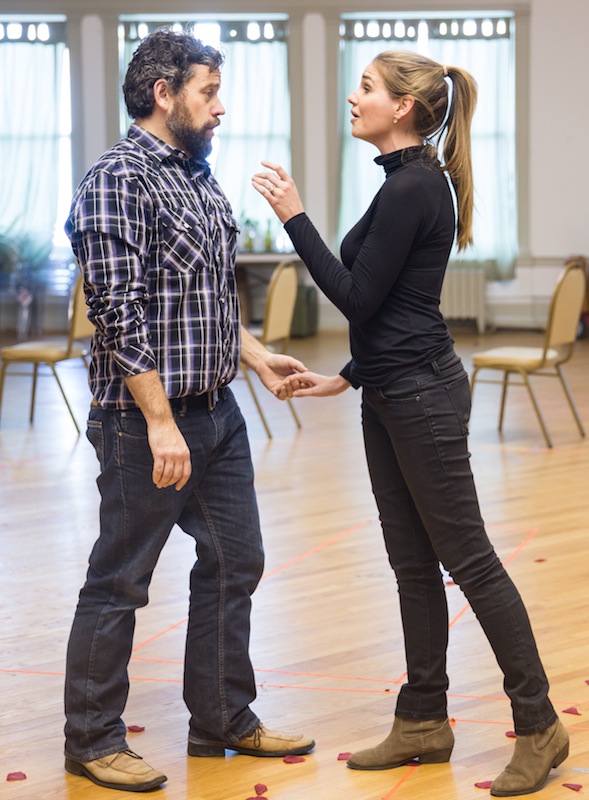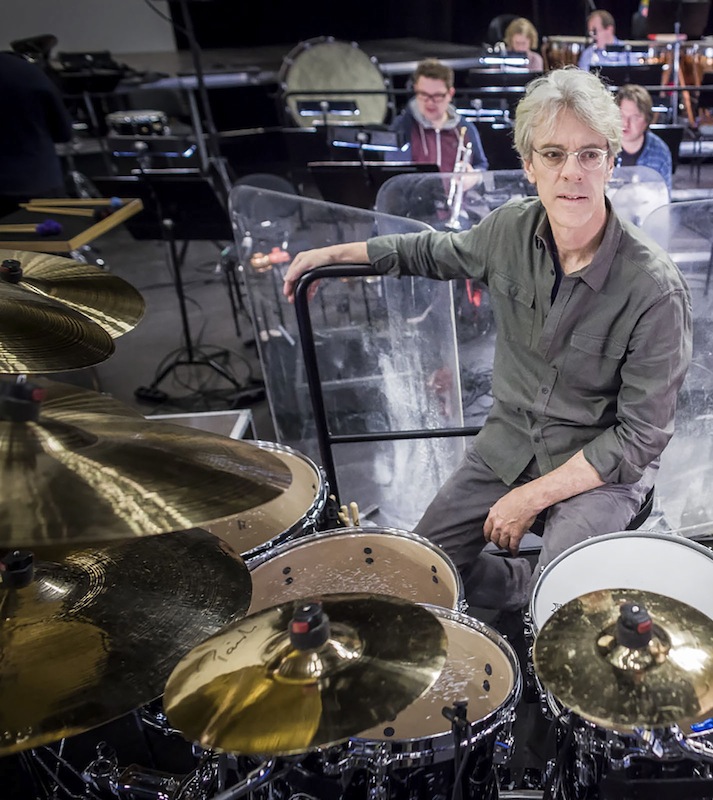Amid change at the top, COT prepares for world premiere of “Morel”

Chicago Opera Theater marks a significant milestone with its newest offering, The Invention of Morel opening Saturday night at the Studebaker Theater.
Composed by Stewart Copeland, co-founder and drummer of British rock band The Police, the opera is the first world premiere in COT’s 43-year history. A co-commission with the Long Beach Opera, it is a blend of science fiction and romance inspired by a 1940 novel by Argentinian author Adolfo Bioy Casares.
But the evening also will mark a finale of sorts for COT’s artistic director, Andreas Mitisek. In an unexpected move earlier this month, Mitisek, COT’s artistic director since 2012, announced that he would not renew his five-year contract. He will step down in September, and Douglas Clayton, COT’s executive director since June 2015, will become general director. Mitisek has conducted as well as directed many COT productions, and when he departs, the company will add a part-time music director to its roster.
For the past five years Mitisek, 54, has juggled two jobs: heading both COT and Long Beach Opera, where he has been artistic and general director since 2003. He is also directing and conducting opera elsewhere, including two productions last year for New York City Opera. Now, Mitisek said, he wants to focus more on artistic matters rather than the practical logistics of steering two regional American opera companies. (Mitisek’s contract with Long Beach Opera expires in September, and he and company officials say they are discussing its renewal.)
“My heart is torn, of course,” Mitisek said about his plans to leave COT. “There are a couple of things. One is that I’m looking at focusing really a lot more on the artistic side of the things I want to do. Looking forward, I think it’s only fair and honest to COT to move on. And it’s really, really a good time to do that. I like to leave on a high note and hand it over in a position that’s quite different from when I came here. I’m leaving the organization with a path forward.”
Indeed, for a company that’s had its share of near-death experiences due to financial problems, COT is in astoundingly good financial health. With no debt and a $850,000 cash reserve, it also is putting the finishing touches on a strategic plan to solidify its goal of bringing new and rarely performed operas to an expanding audience. Not all of Mitisek’s production innovations have worked, and COT continues the struggle to find a sizable audience. But in terms of organization, finances and sustainable artistic goals, the company is on more solid ground than in 2012.
Mitisek will work with COT in the future, including a production yet to be announced for next season. He hopes to help develop new operas as well as direct and conduct beyond Long Beach and Chicago.
“It’s a combination of all these things,” said Mitisek. “I need to find time to really develop some operas I want to be involved in, to maybe bring together a consortium of companies that would be interested eventually. But also maybe do more around the country as a director and maybe other functions.”
“Composers and writers and librettists are pretty high on his priority list,” said Clayton in an interview before COT revealed Mitisek’s plans, “just in the way Andreas operates, the people he likes to learn about and spend time with. He’s really interested in that original germination of an idea.”
Bringing a world premiere to Chicago was high on Mitisek’s priority list as COT’s artistic chief, and it’s fitting that he achieved that goal while closing his tenure here. (COT’s season wraps in April with Philip Glass’s The Perfect American, a fantasy on the life of Walt Disney staged by Kevin Newbury. Mitisek will conduct both The Invention of Morel and The Perfect American.)
Mitisek and Copeland worked together in Long Beach in 2013 when the company staged Copeland’s Tell-Tale Heart, a 2010 work based on the Edgar Allan Poe story. The two considered future projects, eventually settling on The Invention of Morel, which Long Beach Opera will present next season.

Running about 90 minutes, the opera is based on a relatively short novel. But it grew out of plans for something much larger: James Joyce’s Finnegans Wake.
“I was suffering from the failure to get the rights to Finnegans Wake,” said Copeland, describing a lengthy, exhausting process of shaping Joyce’s famously sprawling novel into an opera and dealing with the writer’s famously difficult grandson and executor, Stephen James Joyce. When those plans fell through, Copeland’s 18-year-old daughter, Grace, suggested The Invention of Morel. Though little known in the U. S., Copeland describes it as “a big deal in the Spanish-speaking world.”
“The first thing that caught my eye,” he said with a laugh, “was the slimness of the volume.”
Copeland, 64, is a bona fide rock star, inducted into the Rock and Roll Hall of Fame in 2003 as a co-founder, along with Sting, of The Police. Born in Virginia, he grew up in the Middle East where his father, a CIA officer, was initially posted. He spent his high school and college years in England and the U.S. Copeland heard classical music around the house as a youngster and studied the drums formally. But, he said, “I am by no means a classical musician. My genre comes from rock music; that’s informed all of my work.”
Once The Police wound down in the 1980s, Copeland started composing everything from video game and film scores to ballets, orchestral pieces and operas. He has been working for decades with Jonathan Moore, a noted British actor, director, who wrote the libretto for The Invention of Morel and also directs the production. They met, as Moore recalled, in 1990 at a seminar sponsored by the English National Opera.
“We met at the rather unusual setting of the English National Opera’s contemporary music symposium,” said Moore, “which brought together composers and librettists. Quite literally, if there had been some kind of cultural terrorist involved, an entire generation of opera makers would have been wiped out.”
During the multi-day seminar Moore and Copeland were assigned to the same small study group. “I thought, ‘My God, there’s that bloke from The Police,’” said Moore. “ ‘What’s he’s doing here?’ It quickly became clear, however, that he was extremely intelligent, well-read, a very well-traveled, erudite person–a first rate mind. This isn’t your average rock and roller, whatever that is.”
Moore worked with Copeland on Finnegans Wake, a project, said the librettist, that defined them as “clearly certifiable.’’ In comparison, turning the fantastical plot of The Invention of Morel into an opera was relatively easy.
The story involves an escaped fugitive holed up on a remote island. One day he comes upon a crowd of mysterious tourists to whom he is entirely invisible. Like Bill Murray’s anchor man in the film Ground Hog Day, they spend their lives on a continuously repeating time loop before disappearing, leaving no trace of their existence. Having fallen in love with one of the women, the fugitive tinkers with a machine invented by a mad scientist named Morel, hoping it will overcome the problems of time and space keeping him from his beloved.
“This is a very lengthy and complicated process,” said Copeland of writing opera. “But it’s deeply engrossing. The three years that I spent on Morel, I’m sad they’re over. I could spend another two years getting deeper and deeper into it.
“We didn’t get it right the first time, clever as we are,” he said about shaping the story that shifts constantly between fantasy and reality. “We took a few running jumps at it. First, what are the things that we need? Then you look at all the other fantastic stuff that’s there—there’s the cruel process of redaction.”
Several workshops in Long Beach and Chicago helped Copeland and Moore figure out what did and did not work. The music is through composed, but the rhythmic pulse that drives rock and roll also propels Morel, whose pit band will be Fulcrum Point New Music Project, one of Chicago’s leading contemporary chamber ensembles, plus electric guitar.
“Rock music has informed most of my work,” said Copeland. “They use steady tempo, discernible rhythms. A lot of things are very simplified in rock music, and I stick to that simple pattern. But as I get more and more into it, I am mixing it up more and more. Morel would be the furthest departure from what I came from, but it still isn’t classical. It still uses what I’ve learned from the two-way street that is pop music. I hope the audience will have an engrossing emotional experience.”
Appropriately for an opera whose cast of characters includes a mad scientist, technology is an important production tool in Moore’s staging. COT is even offering audiences a dose of virtual reality to immerse them in the story before the curtain goes up. For an hour before each performance, ticket holders will be able to go into a room off the Studebaker Theater’s lobby and strap on virtual reality goggles. Thanks to computer-generated images, they will feel like they’re on a boat traveling toward the island where the opera will unfold.
“It’s amazing how immersive it is,” said Clayton. “This is COT trying to push the boundaries of opera in other ways.”
The Invention of Morel will be performed by Chicago Opera Theater 7:30 p.m. Saturday and February 24, and 3 p.m. Feb. 26 at the Studebaker Theater, 410 S. Michigan Avenue. chicagooperatheater.org.
Posted in News


